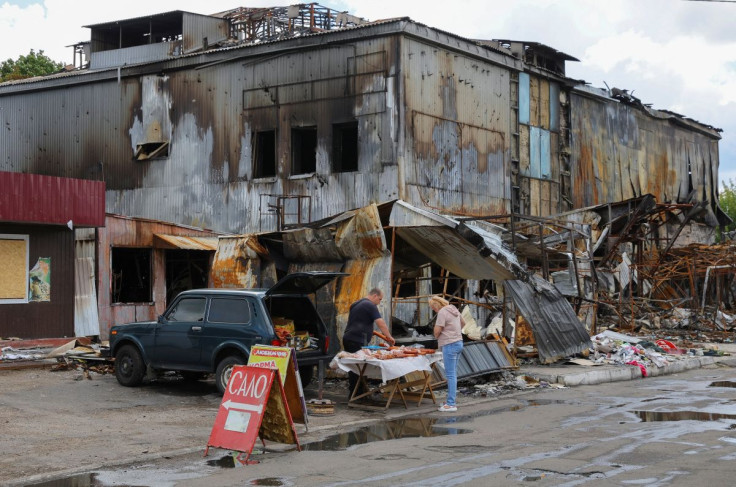Russian Missiles Hit Ukraine Port; Kyiv Says It Is Still Preparing Grain Exports

Russian missiles hit Ukraine's southern port of Odesa on Saturday, the Ukrainian military said, threatening a deal signed just a day earlier to unblock grain exports from Black Sea ports and ease global food shortages caused by the war.
Ukrainian President Volodymyr Zelenskiy said the strike showed Moscow could not be trusted to implement the deal. However, public broadcaster Suspilne quoted the Ukrainian military as saying the missiles had not caused significant damage and a government minister said preparations continued to restart grain exports from Black Sea ports.
The deal signed on Friday by Moscow and Kyiv and mediated by the United Nations and Turkey was hailed as a breakthrough after nearly five months of punishing fighting since Russia invaded its neighbour. It is seen as crucial to curbing soaring global food prices by allowing grain exports to be shipped from Black Sea ports including Odesa.
U.N. officials had said on Friday they hoped the agreement would be operational in a few weeks, and the strikes on Odesa drew strong condemnation from the United Nations, the European Union, the United States, Britain, Germany and Italy.
Turkey's defence minister said Russian officials had told Ankara that Moscow had "nothing to do" with the strikes on Odesa. Neither a Russian defence ministry statement nor the military's evening summary on Saturday mentioned any missile strike in Odesa. The ministry did not reply to a Reuters request for comment.
Two Russian Kalibr missiles hit the area of a pumping station at the port, while two others were shot down by air defence forces, according to Ukraine's Operational Command South. Ukrainian air force spokesperson Yuriy Ignat said the missiles were fired from warships in the Black Sea near Crimea.
Suspilne quoted Ukraine's southern military command spokesperson Natalia Humeniuk as saying the port's grain storage area was not hit.
"Unfortunately there are wounded. The port's infrastructure was damaged," said Odesa region governor Maksym Marchenko.
But Infrastructure Minister Oleksandr Kubrakov said on Facebook that "we continue technical preparations for the launch of exports of agricultural products from our ports".
SAFE PASSAGE
The strike appeared to violate the terms of Friday's deal, which would allow safe passage in and out of Odesa and two other Ukrainian ports.
"This proves only one thing: no matter what Russia says and promises, it will find ways not to implement it," Zelenskiy said in a video posted on Telegram.
U.N. Secretary-General Antonio Guterres "unequivocally condemned" the strikes, a spokesperson said, adding that full implementation of the deal was imperative.
"These products are desperately needed to address the global food crisis and ease the suffering of millions of people in need around the globe," spokesperson Farhan Haq said.
Turkish Defence Minister Hulusai Akar said in a statement: "In our contact with Russia, the Russians told us that they had absolutely nothing to do with this attack, and that they were examining the issue very closely and in detail".
"The fact that such an incident took place right after the agreement we made yesterday really worried us," he added.
Ukraine has mined waters near its ports as part of its war defences, but under the deal pilots will guide ships along safe channels.
A Joint Coordination Center (JCC) staffed by members of all four parties to the agreement will then monitor ships transitting the Black Sea to Turkey's Bosphorus Strait and off to world markets.
All sides agreed on Friday there would be no attacks on these entities and it would be up to the JCC to resolve any prohibited activity.
'SPIT IN THE FACE'
Ukraine foreign ministry spokesperson Oleg Nikolenko said on Facebook that "the Russian missile is (Russian President) Vladimir Putin's spit in the face" of Guterres and Turkish President Tayyip Erdogan.
The U.S. ambassador to Kyiv, Bridget Brink, wrote on Twitter, "The Kremlin continues to weaponize food. Russia must be held to account".
Moscow has denied responsibility for the food crisis, blaming Western sanctions for slowing its own food and fertiliser exports and Ukraine for mining the approaches to its ports.
A blockade of Ukrainian ports by Russia's Black Sea fleet since Moscow's Feb. 24 invasion has trapped tens of millions of tonnes of grain and stranded many ships.
This has worsened global supply chain bottlenecks and, along with Western sanctions on Russia, stoked food and energy price inflation. Russia and Ukraine are major global wheat suppliers and a global food crisis has pushed some 47 million people into "acute hunger," according to the World Food Programme.
The deal would restore grain shipments from the three reopened ports to pre-war levels of 5 million tonnes a month, U.N. officials said.
Zelenskiy said it would make around $10 billion worth of grain available for sale with roughly 20 million tonnes of last year's harvest to be exported. However, on the wider conflict, he told the Wall Street Journal there could be no ceasefire without retaking lost territory.
Three people were killed when 13 Russian missiles hit a military airfield and railway infrastructure in Ukraine's central region of Kirovohrad on Saturday, the regional governor said on television.
Ukraine struck a bridge in the occupied Black Sea region of Kherson, targeting a Russian supply route, a Ukrainian official said. The deputy head of the Russian-installed regional authority said the bridge had been hit but was still operating, Russia's TASS news agency said.
Putin calls the war a "special military operation" and has said it is aimed at demilitarising Ukraine and rooting out dangerous nationalists. Kyiv and the West call this a baseless pretext for an aggressive land grab.
© Copyright Thomson Reuters 2024. All rights reserved.





















